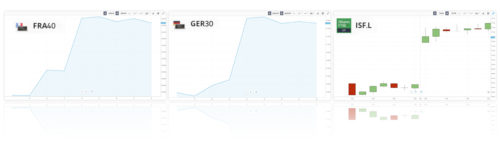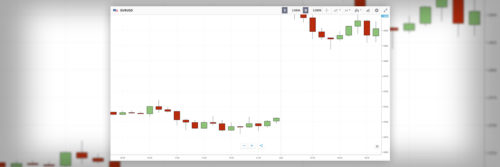Global markets reacted in a tremendously positive way to Emmanuel Macron’s lead in the first round of the French elections. After he received the most votes, the Euro skyrocketed and leading indices in France, the UK and Germany showed triple-digit point gains. However, there’s another round coming, which will pin Macron against Marine Le Pen, whose plans for the French economy vary greatly from those of her rival.

Polls are currently predicting a landslide victory for Macron, leading Le Pen by more than 20%. And yet, if the recent presidential race in the US has taught us anything, it is that polling numbers should be taken with a grain of salt (or an entire salt shaker). So what’s in store for France and the rest of the world following the presidential run off? Here’s a breakdown:
The likely scenario: Macron wins
Aside from a small advantage seen for Le Pen a few weeks before the first round, 39 year-old Macron has been the favorite throughout the race. Macron, who served as Economy Minister, is perceived as the candidate that will bring some calmness to the stormy waters of the post-Brexit European economy. The market’s faith in Macron was extremely apparent following his first round lead, which triggered a rally in global markets.

Macron is perceived as a centrist by some. On the one hand, his stance towards immigration is more left-leaning, while on the other, his economic plan is libertarian. With plans for renegotiating the 35-hour work-week and easing corporate taxes, from a macroeconomic standpoint, he is seen by some as the one who will bring balance to the French economy. Moreover, Macron is a firm believer in the EU and has repeatedly said that he wishes to strengthen French ties with the rest of the Union. If he is declared winner on May 8th, it is very likely that we will see another rally in European markets.
The EU’s nightmare: Le Pen wins
A dominant figure in France, nationalist right-wing leader Marine Le Pen has entirely different plans than Macron. Le Pen’s platform is centred around nationalist policies and distancing France from the EU. Her firm stance against immigration, calling for the deportation of illegal immigrants and imposing a hard limit on legal migration do not coincide with the EU’s policies. Therefore, it is not far-fetched to assume that a win by her could signal another major economy breaking away from the EU.
A so-called “Frexit” would be catastrophic for the European Union. With the UK on its way out, France is set to become the second-largest economy in the Union – and another divorce could signal the beginning of the EU’s collapse. Internally, Le Pen promises to keep the 35-hour workweek and retirement age of 60 in place. These decisions could limit the flexibility of the French workforce and in turn could hinder the processes needed to rejuvenate the country’s economy.
Conclusion: How should you prepare?
The general assumption is that Macron will win, giving the Euro and European indices another boost. However, it is also possible that the rally seen after the first round was fueled by predictions of Macron winning in the second, meaning there will not be another major rally if he becomes President. On the other hand, if Le Pen beats all predictions and wins, it is very likely that markets will tumble, as France and the rest of the world wake up to a new economic reality. Either way, there should be plenty of opportunities for traders in the days surrounding the French elections.

